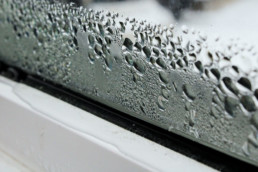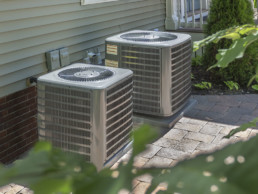Your Air Conditioner, Humidity and AC Drain Lines Explained
Your air conditioner--when working properly--draws moisture from the air and generates water as part of the condensation process. The water produced by the AC system typically runs out the back of the unit or drains into condensation pan attached to a drain line designed to channel the water to a safe area. If you don’t pay attention, water can collect inside the system or drip into areas of your home causing damage.
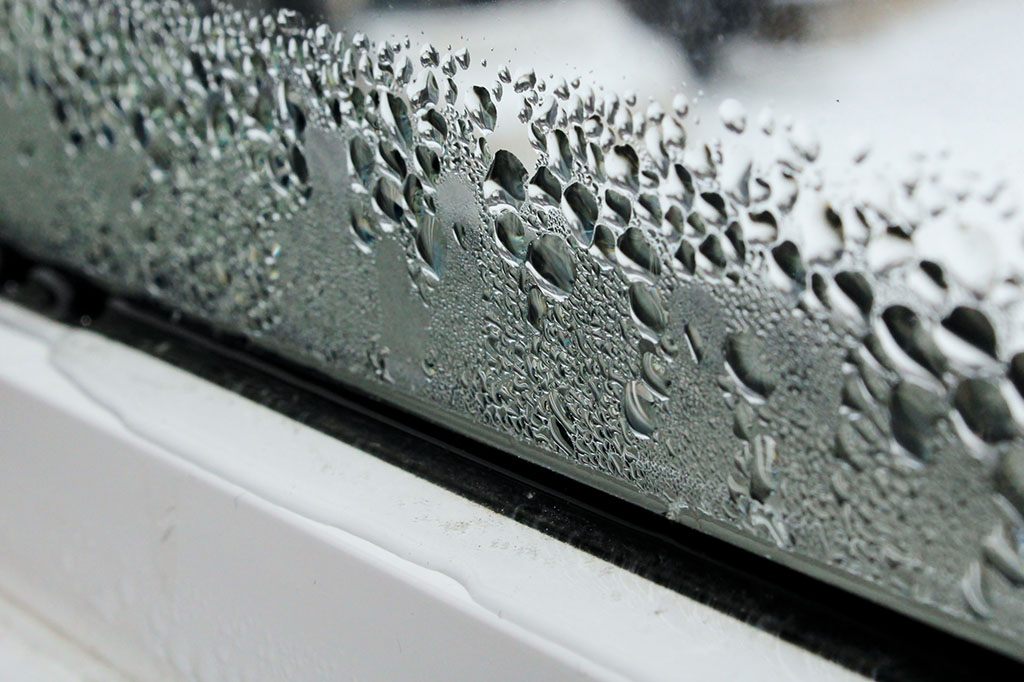
That’s why it’s important to understand how your system works, the effects of humidity and where your AC drain lines are located.
How AC Systems Work
HVAC systems generate water when cooling homes. AC units feature two sets of coils that continuously heat and cool the ambient air. The coils are connected by a condenser that rapidly heats and cools the air and evaporates and condenses water from the humidity in the air. Condensers use refrigerant chemicals to facilitate the cooling process. The refrigerant cools the coils, which cool air that flows over them. Moistures condense on the coils. Some water re-evaporates to provide additional cooling, but the process produces more moisture than can be handled. This water must be channeled out of the system. You’ve probably observed dripping window-AC units. All cooling systems must drain excess water, or problems will develop. The problems of excess moisture and clogged drain lines include:
- Water Blown by Internal Fans
If excess water gets blown back onto the coils, it can begin to ice over. That’s why many AC units “freeze up” and stop cooling properly. Many people understand that it’s sometimes necessary to turn off a unit to melt excess ice on the coils. You can speed the process by using a hairdryer to melt the ice faster. You should never try to chip off the ice because this can damage the coils. - Unsealed Units
Units that are improperly sealed--especially window units-- can allow warm, humid air to infiltrate the home. This puts more stress on cooling units, and the warm air can cause condensation on the outside of the units, which drips onto floors. - Clogged Drain Lines
Drain lines can get clogged from mold and algae growth, which dramatically affects AC performance. Clogged drains result in water overflowing the drain pans and damaging your home’s infrastructure and your AC system. Some systems have sensors that will turn off the systems when the AC drains get clogged. You can deal with a clogged drain by turning off the unit at the breaker and removing the condensation pan. If the pan is holding water, the drain is probably clogged. Dump the water, and clean and dry the pan. Use a shop vacuum to apply suction to the line to clear it. Once clear, pour distilled vinegar or hydrogen peroxide down the drain to dissolve any remaining growth. - Improper Sizing
If your unit isn’t big enough to handle your cooling needs, it will likely produce excessive water. One solution might be to use a dehumidifier. Dehumidifying the home has the added advantage of allowing you to set your AC to a higher temperature and remain comfortable. - Water Damage
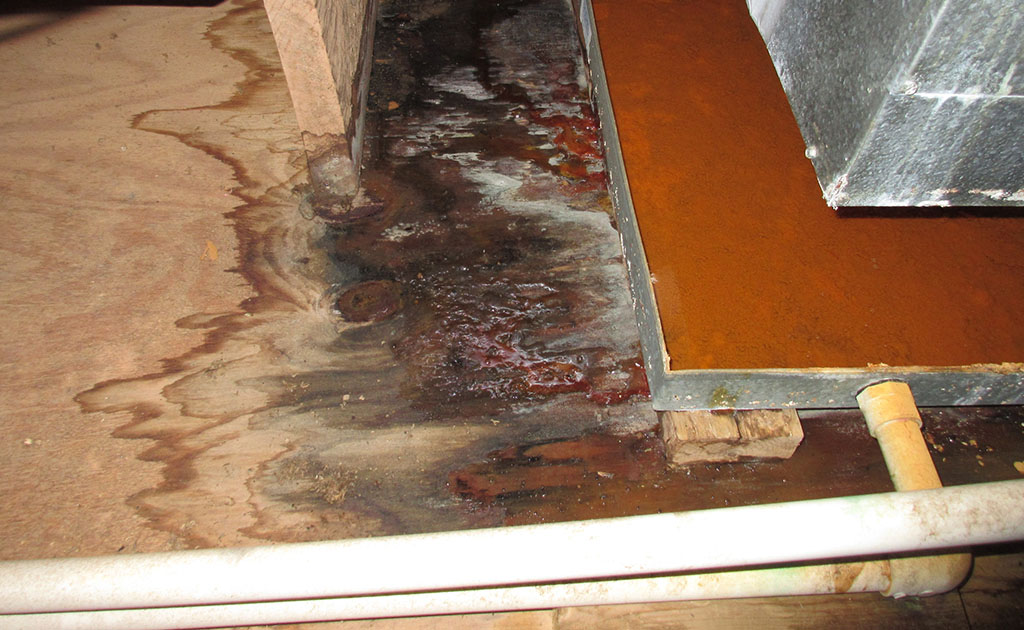
Excess water can damage all parts of your AC system. You might require parts or system replacement if the excess water isn’t addressed for a long time. Water intrusion from AC units can also damage your home and decrease AC efficiency.
Florida’s Heat and Humidity
In Venice and the surrounding areas of Florida, hot and humid weather is a year-round concern. Winter is more likely to be hot than cold, so residents worry more about humidity and comfort than heat. AC bills are big concerns, and keeping track of the water drainage of your cooling system is one of the best ways to keep bills lower and prevent problems.
Water Intrusion in AC Systems
Water intrusion in AC systems in Florida is a major issue, so residents should keep track of how well their systems drain any excess water. The growth of mold and mildew in hot, humid weather is a constant problem, but you can check your drain lines regularly to keep them clear. The first step is getting familiar with your AC system and learning where your drain line is and where it drains.
You can monitor your air conditioner and make minor repairs, but if your quick fixes don’t work, you might need professional HVAC service. Experienced technicians have the answers and tools to make your life in Venice, Florida more comfortable. Regular repairs and maintenance save money over time and create a better quality-of-life for you and your family. Call or text us at (941) 203-7955 for more information.
The Role of Humidity on Heating and Cooling in the Home
The excessive Florida heat, combined with humidity. makes us feel hotter, and also has a significant impact on A/C systems. However, many people don’t know that humidity also affects heating systems.
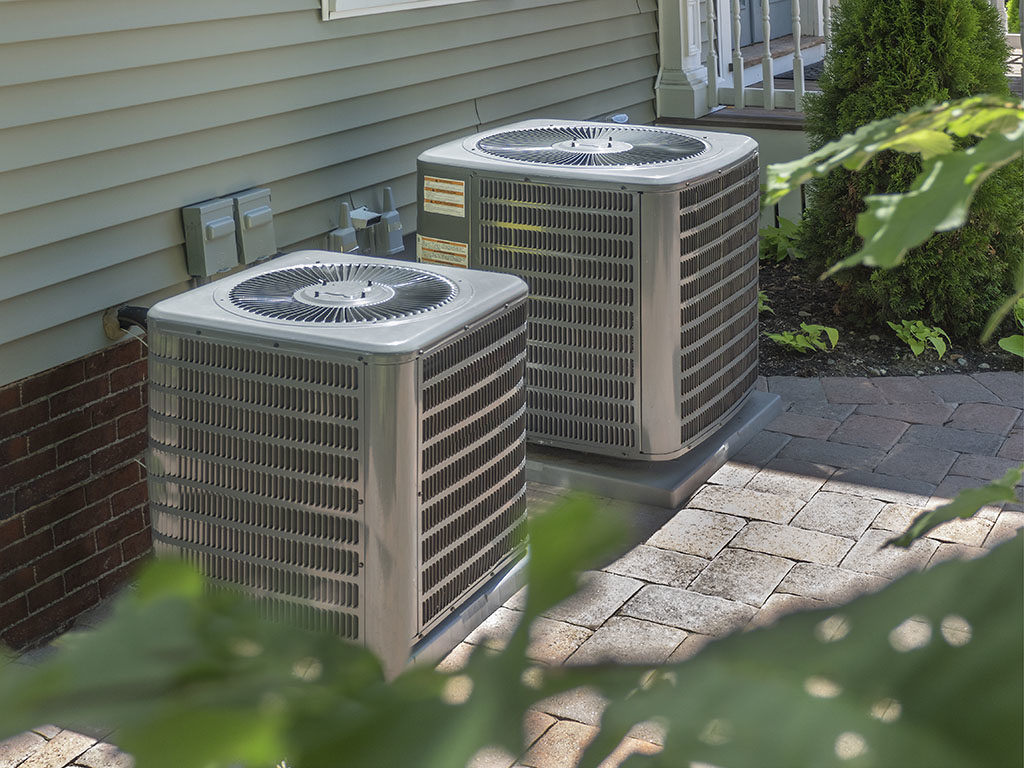
The humidity inside a home matters, because it directly contributes to the home’s comfort level. The HVAC systems of today have begun to include tools to help control humidity, including checking levels and adjusting with humidifiers or dehumidifiers, as needed. Understanding how humidity affects the indoors, and why it needs to be controlled, is the beginning step toward lowering energy bills while maintaining a comfortable home.
Humidity and Air Conditioning
As mentioned, humidity affects how well the A/C unit cools the home. The cooling unit works by taking moisture and heat out of the air. This means that higher humidity levels make the unit work much harder. The unit must have an adequate cooling capacity to handle both the heat and the humidity. There are a few ways to know if the humidity is simply too high for the unit to handle.
- Clammy, sticky feeling. If your skin feels sweaty and clammy indoors, the humidity may be too high.
- Windows fog over. This is due to the vaporized water droplets in a humid home.
- A strange smell. A musty, old attic type of smell signals excessive humidity. This is because the home is constantly damp.
A strong A/C system will take moisture out of the air and help reduce humidity levels. However, there are hot summer days when the unit will not be able to handle the excessive moisture levels. Humidity will cancel the cooling process of the unit, and the home will feel warmer. The unit will continue to run but there will be little to no benefit from it. The home is not being cooled effectively, and money is being tossed out the window.
This is why many people may purchase a larger A/C unit, believing it will be more effective in home cooling. That larger unit will not necessarily be more effective. If the overall capacity is larger than the home needs, it won’t handle the excessive moisture effectively. The humidity level inside the home will stay high. Those larger air conditioners won’t run as often, and won’t be able to take enough moisture out of the air. It is essential to buy a unit that is suited for your home size.
Beating The Heat in the Air
The best way to combat humidity year round is to make sure a dehumidifier is installed on the HVAC system. The moisture will be pulled out of the air before it enters the home. A dehumidifier that is paired with an air conditioning unit allows you to control dehumidifying levels and temperature from a central gauge inside the home.
When the humidity level is controlled in the summertime, the air conditioning unit works better. The home feels cooler and is far more inviting in the Florida summer heat. Additionally, you’ll stop throwing away money and the energy bill will be a little lighter. All other issues, such as musty smells, foggy windows or clammy skin should also disappear.
Humidity and Heating
Wintertime brings low humidity levels, which might seem like a relief. However, the lower humidity actually causes problems for heating systems. As humidity levels drop, the home feels colder than its actual indoor temperature. As with the A/C unit, the heater starts to work harder, but the home still does not feel warmer. You’ll turn up the heat looking for relief that will never come because there is not enough moisture available to warm up the air around you.
The ideal setting for a thermostat is between 72 and 75 degrees. This range is most effect for cost and comfort. However, this range stops working when the humidity level is below 50%. The apparent temperature, which is how a home feels, will be lowered below this percentage.
The best way to combat this issue is with a humidifier in the wintertime. Similar to the dehumidifying device, this device can be attached to the HVAC system. It will add moisture to the dry winter air before it comes into the home. Relative humidity will be kept higher than 50%, making the home feel warmer. As in the summer, the end result is a lower energy bill. The system can be monitored from a central gauge inside the home, so heating and humidity levels can be adjusted simultaneously.
Keeping the humidity inside the home balanced is the secret to reducing energy bills and maintaining a comfortable home. Many people do not realize that a simple adjustment to the HVAC system will reduce year-round energy bills and create a comfortable living environment. Further, the system can be fully controlled from inside the home through every season. One simple adjustment will improve the overall function of the home and provide a place to escape the fickle, sometimes harsh Florida weather. Call or Text us today for more details (941) 203-7955.
